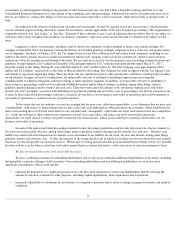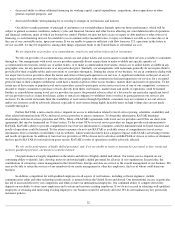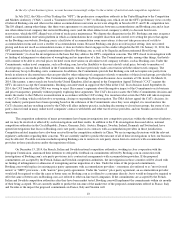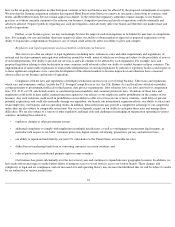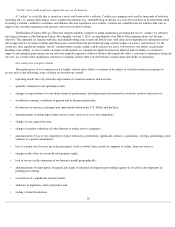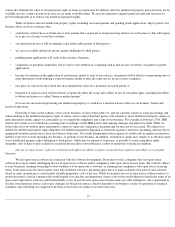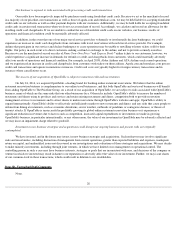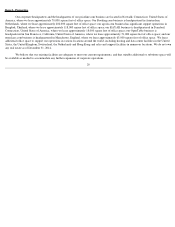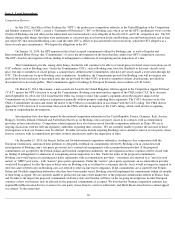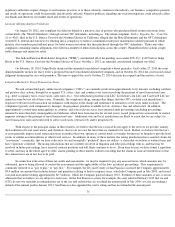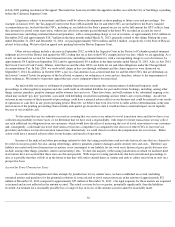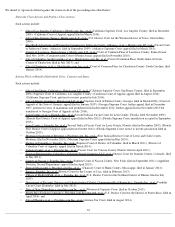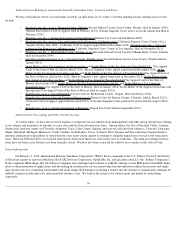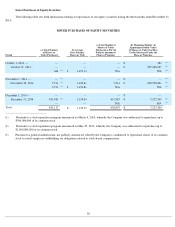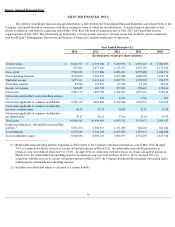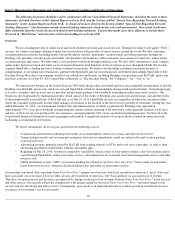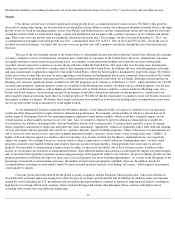Priceline 2014 Annual Report Download - page 35
Download and view the complete annual report
Please find page 35 of the 2014 Priceline annual report below. You can navigate through the pages in the report by either clicking on the pages listed below, or by using the keyword search tool below to find specific information within the annual report.
regulatory authorities require changes to our business practices or to those currently common to the industry, our business, competitive position
and results of operations could be materially and adversely affected. Negative publicity regarding any such investigations could adversely affect
our brands and therefore our market share and results of operations.
Lawsuits Alleging Antitrust Violations
On August 20, 2012, one complaint was filed on behalf of a putative class of persons who purchased hotel room reservations from
certain hotels (the "Hotel Defendants") through certain OTC defendants, including us. The initial complaint, Turik v. Expedia, Inc. , Case No.
12-cv-4365, filed in the U.S. District Court for the Northern District of California, alleged that the Hotel Defendants and the OTC defendants
violated U.S. federal and state laws by entering into a conspiracy to enforce a minimum resale price maintenance scheme pursuant to which
putative class members paid inflated prices for hotel room reservations that they purchased through the OTC defendants. Thirty-one other
complaints containing similar allegations were filed in a number of federal jurisdictions across the country. Plaintiffs in these actions sought
treble damages and injunctive relief.
The Judicial Panel on Multidistrict Litigation ("JPML") consolidated all of the pending cases under 28 U.S.C. §1407 before Judge
Boyle in the U.S. District Court for the Northern District of Texas. On May 1, 2013, an amended consolidated complaint was filed.
On February 18, 2014, Judge Boyle dismissed the amended consolidated complaint without prejudice. On October 27, 2014 the court
denied plaintiffs' motion for leave to file a proposed Second Consolidated Amended Complaint, and on October 28, 2014 the court issued a final
judgment dismissing the case with prejudice. The time to appeal the court's October 27, 2014 decision has expired and the matter is closed.
Litigation Related to Travel Transaction Taxes
We and certain third-party online travel companies ("OTCs") are currently involved in approximately forty lawsuits, including certified
and putative class actions, brought by or against U.S. states, cities and counties over issues involving the payment of travel transaction taxes
(e.g., hotel occupancy taxes, excise taxes, sales taxes, etc.). Our subsidiaries priceline.com LLC, Lowestfare.com LLC and Travelweb LLC are
named in some but not all of these cases. Generally, the complaints allege, among other things, that the OTCs violated each jurisdiction's
respective relevant travel transaction tax ordinance with respect to the charge and remittance of amounts to cover taxes under each law. The
complaints typically seek compensatory damages, disgorgement, penalties available by law, attorneys' fees and other relief. In addition,
approximately seventy-nine municipalities or counties, and at least eleven states, have initiated audit proceedings (including proceedings
initiated by more than forty municipalities in California, which have been inactive for several years), issued proposed tax assessments or started
inquiries relating to the payment of travel transaction taxes. Additional state and local jurisdictions are likely to assert that we are subject to
travel transaction taxes and could seek to collect such taxes, retroactively and/or prospectively.
With respect to the principal claims in these matters, we believe that the laws at issue do not apply to the services we provide, namely
the facilitation of travel reservations, and, therefore, that we do not owe the taxes that are claimed to be owed. Rather, we believe that the laws
at issue generally impose travel transaction taxes on entities that own, operate or control hotels (or similar businesses) or furnish or provide hotel
rooms or similar accommodations or other travel services. In addition, in many of these matters, the taxing jurisdictions have asserted claims for
"conversion" - essentially, that we have collected a tax and wrongfully "pocketed" those tax dollars - a claim that we believe is without basis and
have vigorously contested. The taxing jurisdictions that are currently involved in litigation and other proceedings with us, and that may be
involved in future proceedings, have asserted contrary positions and will likely continue to do so. From time to time, we have found it expedient
to settle, and may in the future agree to settle, claims pending in these matters without conceding that the claims at issue are meritorious or that
the claimed taxes are in fact due to be paid.
In connection with some of these tax audits and assessments, we may be required to pay any assessed taxes, which amounts may be
substantial, prior to being allowed to contest the assessments and the applicability of the laws in judicial proceedings. This requirement is
commonly referred to as "pay to play" or "pay first." For example, the City and County of San Francisco assessed the Company approximately
$3.4 million (an amount that includes interest and penalties) relating to hotel occupancy taxes, which the Company paid in July 2009, and issued
a second assessment totaling approximately $2.7 million
, which the Company paid in January 2013. Payment of these amounts, if any, is not an
admission that we believe we are subject to such taxes. In the San Francisco action, for example, the court ruled in February 2013 that we and
OTCs do not owe transient accommodations tax to the city and ordered the city to refund the amount paid in July 2009; we also are seeking a
refund of the amount paid in January 2013. San Francisco has appealed the court's ruling and has not refunded the amount paid
31


